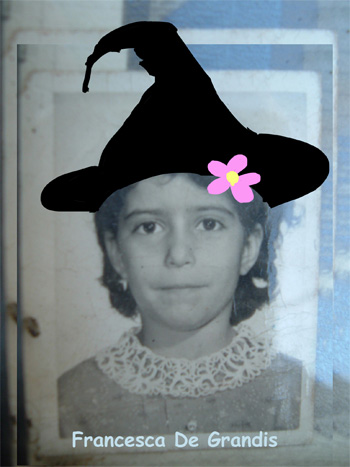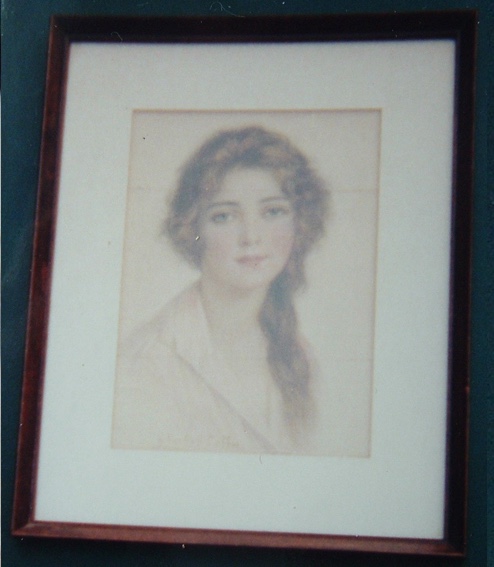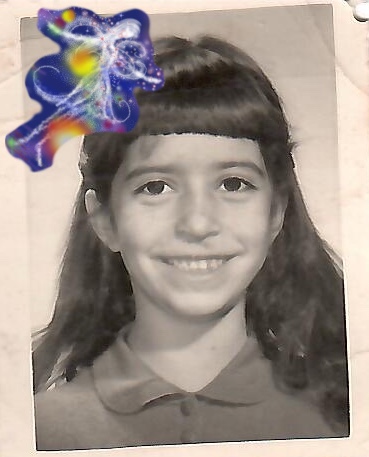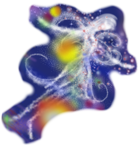I Joined the Fairy Circus
Look at my face as a child. Do I look like I was ever suited to a “normal” life?
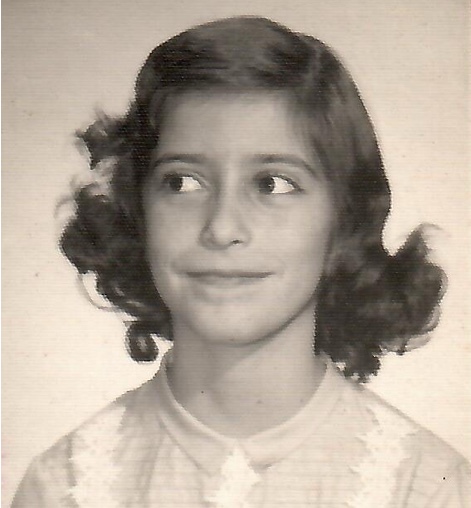
Obviously, I had to join the circus of life, become a fairground barker, jump on a magic carousel, perform in the Fairy Big Top, and travel with a carnival between the worlds.
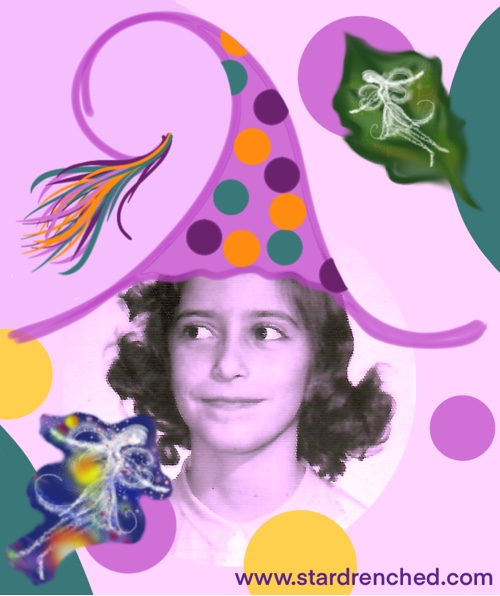
Hard Traveling
William, the man who raised me, started traveling poor and hard when he was about twelve. My research indicates that his mom couldn’t afford to feed him, so he left home at age seven to work on a farm. A census puts him on a farm at that time, but not in his mom’s household. This is corroborated by a family member mentioning an “uncle” whose farm she visited as a child. The “uncle’s” name is the same as little William’s employer. There is also a relevant photo.
A census also shows that William (Bill) returned home, where his mother now lived with a new husband and his son. That unfortunate young boy stole milk from his front porch after the milkman delivered it because there was not enough food in the home. He would drink from the bottle and then add water to hide his theft. He told this to his daughter, my cousin, who passed the story on to me when I told her I suspected Dad had lived in poverty as a child.
It appears that young Bill left home again soon, to hit the road at age twelve. This was a common solution if a household had too many mouths to feed.
If my earlier writing about Bill contradicts anything here, it is likely because my research netted new information.
Request: It seems that the expression hard traveling predates its use in a Woody Guthrie song. If you know otherwise, please tell me. The expression is magical to me.
It might seem odd that a phrase describing hardship is magical to me. It might even appear callous toward individuals who suffer—or have suffered—on the road. I am in no way romanticizing hard traveling or otherwise minimizing it. My family history, including my own, is why the phrase is magic for me. I won’t didactically spell out further explanation here. The situation is nuanced, so perhaps explanations require an oral give-and-take dialogue. But this essay explains in part, not didactically but experientially and embodied.
A Witch Raised on Optimism and Descended from Society’s Hedge Rows
I wonder if Dad’s love of music came from traveling. His adoration of music seemed incongruent with everything else about him. He even loved musicals. But perhaps his love of show tunes came from his mother, who was a showgirl.
I descended from people who were on the edges of society, but they were not always what most people would imagine.
I assumed showgirl was the family euphemism for stripper. But later, I saw a family painting that I was told is a portrait of Bill’s mom. Curious, I went online, armed with the painter’s name: W Haskell Coffin. I discovered he was known for painting Ziegfeld showgirls. If the portrait is Bill’s mother, she was probably in the Ziegfeld Follies or a similar group.
That is not incompatible with being poor. Here are two reasons. Many performers experience economic hardship. As in any business, some people accumulate wealth, some people barely scrape by. If she did make decent money, she would’ve been past the age of a youthful Ziegfeld girl by the time she suffered poverty with young William. He was born six years after the Follies began. Her money could’ve run out by then.
I’ve spent decades researching my family history, trying to understand it. I’m not a trained researcher. My conclusions could easily be amiss. I tell the story best I can. That’s the job of a circus barker. Perhaps putting a family history together best you can is a necessity when you come from the margins. There were so many roadblocks. For example, I contacted an organization that archives material on Ziegfeld girls. The person with whom I spoke explained that a lot of material was lost because, after Ziegfeld died, there was no money to be made from the archives, so no one took care of them. Marginalized because of lack of money.
The following snapshot of the portrait isn’t great. I took it without great equipment decades ago at a family member’s home:
(Update: Further investigation suggests this might not be my grandmother, despite the family’s claim and all the time I’d already spent researching the painting. At least it opened my mind to her being a showgirl instead of a stripper. I hope I discover the group(s) in which she performed, and I am still looking into Ziegfeld. Research is a living process; new findings lead to—or suggest—new conclusions. Unfortunately, most people in the know have passed on. Of the few that remain, I only know one who is a reliable source. Speaking of new findings: After I wrote the above part of this paragraph, I spoke with that trustworthy source—e.g., when her source might be unreliable, she acknowledges it. She provided new history: She too was told Grandma was a showgirl. She was also told that Grandma was an actress. She added that it was implied—though not said outright—that Grandma was not well regarded by the family because of her work.)
Another example of outliers in the family: Bill was as close-minded as they come. But as a teenager, I brought home a stranger. He had no place to sleep, was due to enter the Marines the next day, and carried a guitar. I assumed Dad would angrily turn him away. That would’ve been typical of my close-minded, bitter father. But he gave the guy a bed. I imagine it was in part because the fellow was soon to be a Marine, but that the guitar had a lot to do with it too.
Dad, unexpectedly, adored folk music, not just show tunes. After his World War II military stint, he didn’t return from Europe to his wife and kids right away (I wasn’t born yet, but I know the story). He went south and hung out with hillbillies. Had they met as hard-traveling children? Thus far, I don’t know where else this extremely conservative man could’ve acquired a love of folk music. And unless he had experienced it rooted in his life experiences and worldview, he would’ve loathed it in the ‘60s when it was associated with radical politics.
I am 74 years old. Previous generations of my family are long gone. Their deaths impelled me to investigate old newspapers, public records, etc., long ago. That has been and continues to be fruitful and fascinating. I will keep at it to answer my new questions about Bill and the rest of the family. Plus, the family member who I know to be reliable remains, ever-ready to talk. And the beloved dead appear in visions to point out directions I might pursue or even tell me stories.)
More Lineage from Society’s Hedge-Row Edges
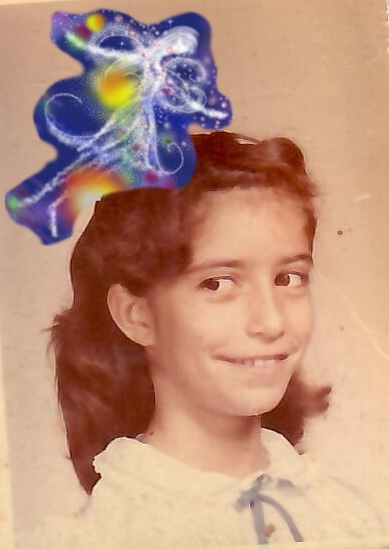
Bill was not my biological dad. DNA indicates my biological father likely descended from nomads. A family story: An Indian prince proposed to Mom but she chose Bill instead. I don’t know what the family meant by Indian. Mom aside, the family’s lack of education and abundance of prejudice means family members might have considered various peoples as Indian. Was my father Arabic? Iranian? Or?
Grandma a showgirl, Bill a hard traveler, biological father possibly a royal nomad, and Mom a fortuneteller from a long line of Italian witches. I was grown in the edges—society’s hedge rows. Add that I was raised on old musicals with their fantastically optimistic themes, and I had to become a performer in the Fairy circus of life—a nomad traveling for sheer joy, both the experience of it and the giving of it.
Hard Times Taught Me Unapologetic Joy
I am grateful to know a beautiful joy that you can learn from hard times. It is a joy you learn to nurture regardless of circumstances. It is a pure, untainted joy.
That’s one reason I love the circus. Circus artists focus on creating joy and wonder, whether as a clown or trapeze artist. Their shows embody unapologetic joy.
Click the newsletter banner below for updates on
Fairy witch magic classes, freebies, and other sparkling happiness.

